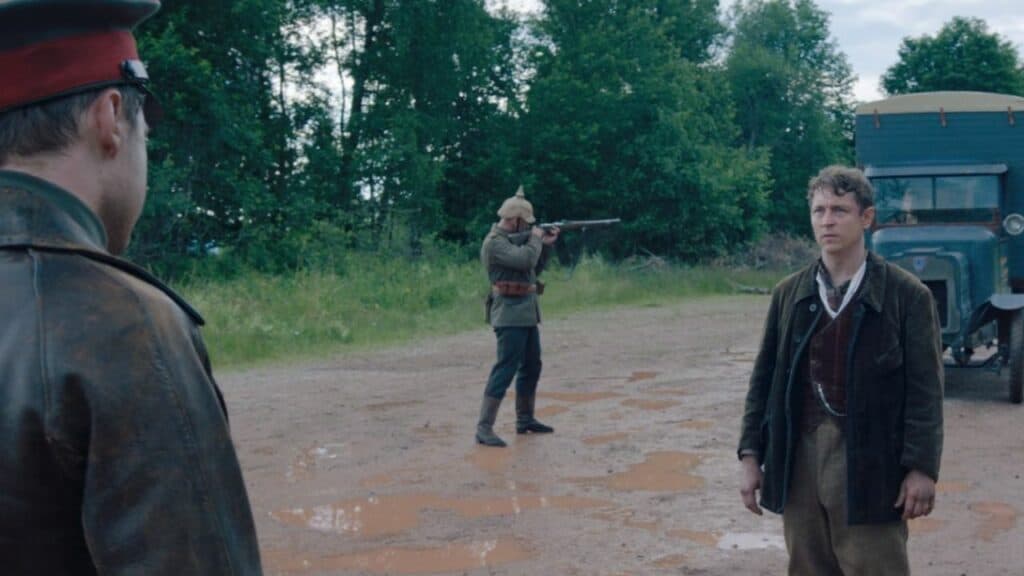In Women at War, Suzanne picks up the identity of a dead person to hide from a detective. Things become complicated for her when that dead person’s husband, Lucien Charrier, shows up looking for his wife.
Suzanne fails to make it in time to save Jeanne Charrier, who was helping her get to Switzerland, far away from Detective Compoing. In order to hide from Compoing, Suzanne picks up Jeanne’s identity and starts working as a nurse at the convent in Saint-Paulin.
Mother Agnes learns about her secret but doesn’t expose her. She makes note of how caring Suzanne is, and she needs people like this at the time of war.
Suzanne works hard to save people, something she loves to do, but she soon finds herself in a tricky situation when a man named Lucien Charrier arrives on his plane, looking for his wife, Jeanne Charrier.
Why does Lucien come to the convent?
Lucien is shocked to see that someone else is pretending to be his wife. Suzanne introduces herself, and Lucien recognizes that she is the abortionist Jeanne was supposed to take to Switzerland.
Lucien doesn’t let anyone know who she really is. Instead, he tells her his own little secret: Jeanne was never his real wife. He proposes to keep her secret if she follows the instructions he gives.

Lucien tracked Jeanne down because she had a document containing France’s plans against the German soldiers. He retrieves these documents by asking Suzanne to take him to Jeanne’s body.
He then forces Suzanne to fly with him to meet the German soldiers, who call these French plans outdated. President Poincare is coming to Saint-Paulin to organize the offensive, and they need those plans from Lucien.
Lucien’s true identity
During his visit to Saint-Paulin, President Poincare is going to award Suzanne, Marguerite, Caroline, and Agnes for their efforts off the battlefield. Lucien sees this as a chance to interact with the president and learn about the new French plans.
When Suzanne refrains from attending this event due to the media’s presence, which will lead Detective Compoing to find her, Lucien decides to reveal his true purpose for going against his own country.
He shows her the picture of his daughter, Claudine. He then reveals that he and Jeanne originally worked for French intelligence. They were given a fake identity as a couple. Someone found out about Lucien’s cover and informed the Germans.
The Germans stormed into his house, killed his wife, and kidnapped his daughter. If Lucien doesn’t give them information on the next offensive, he will never see his daughter again.
Lucien’s death
Lucien fails to get close to President Poincare. He grows desperate and even abuses Suzanne to get his job done. Eventually, General Duvernet himself invites Lucien for assistance in war, as he needs an aviator to conduct reconnaissance flights.
Lucien agrees to fly over the field for him. He becomes part of their next offensive plan and learns what the French army is up to. Lucien grabs those plans and takes Suzanne along with him to meet the Germans.
Before the meeting, Lucien confesses to Suzanne that he isn’t going to tell the Germans anything. He is not a traitor. He is just going to make sure that his daughter, Claudine, comes back safe and sound and joins Suzanne in their truck.

Lucien asks Suzanne to drive away as far as possible once his daughter joins her in the truck. The Germans arrive, and after making sure that his daughter is alright, Lucien grabs that group’s leader and brings out a grenade instead of a French plan.
Claudine joins Suzanne, and they drive away. Once they are a bit far, Lucien lets the grenade go. He kills himself along with those German soldiers.
Suzanne comes back to the convent with Claudine. Mother Agnes takes Claudine in while Suzanne gets back to her job.
Also Read: Women at War review: Engaging drama explores a war beyond the battlefield

